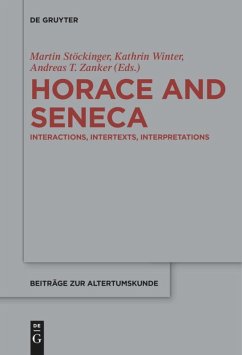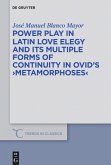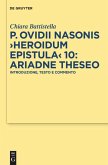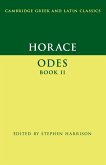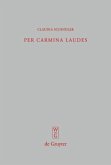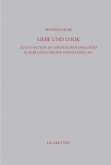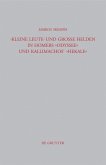This volume sets out to explore the complex relationship between Horace and Seneca. It is the first book that examines the interface between these different and yet highly comparable authors with consideration of their oeuvres in their entirety. The fourteen chapters collected here explore a wide range of topics clustered around the following four themes: the combination of literature and philosophy; the ways in which Seneca's choral odes rework Horatian material and move beyond it; the treatment of ethical, poetic, and aesthetic questions by the two authors; and the problem of literary influence and reception as well as ancient and modern reflections on these problems. While the intertextual contacts between Horace and Seneca themselves lie at the core of this project, it also considers the earlier texts that serve as sources for both authors, intermediary steps in Roman literature, and later texts where connections between the two philosopher-poets are drawn. Although not as obviously palpable as the linkage between authors who share a common generic tradition, this uneven but pervasive relationship can be regarded as one of the most prolific literary interactions between the early Augustan and the Neronian periods. A bidirectional list of correspondences between Horace and Seneca concludes the volume.
Hinweis: Dieser Artikel kann nur an eine deutsche Lieferadresse ausgeliefert werden.
Hinweis: Dieser Artikel kann nur an eine deutsche Lieferadresse ausgeliefert werden.
"This set of fourteen essays is the fruit of a conference held in Heidelberg in 2015 and is an engaging and interesting look at the relationship between these two titans of Roman literature-examining both how Seneca was influenced by Horace and also how they approached the same themes in very different ways. [...] As well as the index and bibliography the book contains a comprehensive bidirectional Table of Correspondences between Horace and Seneca running to twenty-eight pages, distinguishing between verbal and thematic echoes. A huge amount of work has gone into this book and it is a dazzling display of scholarship and intelligent close reading of these two enormous ancient talents. They deserve no less."
John Godwin in: Classics for All, 06.02.2018 https://classicsforall.org.uk/book-reviews/horace-seneca-interactions-intertexts-interpretations/
"Overall, the collection succeeds in presenting a variety of methodologies to explore the literary relationship between the two authors. [...] The volume is an interesting foray into the experiment of juxtaposing two ancient authors to explore how their points of correspondence might inform our understanding of them. The pair in question, Horace and Seneca, are not a slapdash selection, but one which, despite being traditionally classified in two different categories by literary genre, could be assured of a number of touch points due to their biographical details and choice of literary subject matter. One wonders what might result from other similar pairings or perhaps even more brazen pairings of authors. It is our very own modern Plutarchian project of Parallel Lives - and I look forward to more volumes. "
Yasuko Taoka in: The Classical Review 69/1 (2019), 111-114
John Godwin in: Classics for All, 06.02.2018 https://classicsforall.org.uk/book-reviews/horace-seneca-interactions-intertexts-interpretations/
"Overall, the collection succeeds in presenting a variety of methodologies to explore the literary relationship between the two authors. [...] The volume is an interesting foray into the experiment of juxtaposing two ancient authors to explore how their points of correspondence might inform our understanding of them. The pair in question, Horace and Seneca, are not a slapdash selection, but one which, despite being traditionally classified in two different categories by literary genre, could be assured of a number of touch points due to their biographical details and choice of literary subject matter. One wonders what might result from other similar pairings or perhaps even more brazen pairings of authors. It is our very own modern Plutarchian project of Parallel Lives - and I look forward to more volumes. "
Yasuko Taoka in: The Classical Review 69/1 (2019), 111-114

